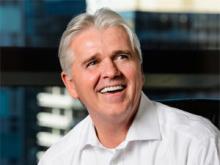Vodafone Australia calls out mobile competition inequity

The combination of Australia's vast land mass and AU$450 million in government subsidies to Telstra over the past decade has made it difficult for competition to thrive in the mobile market, according to Vodafone CEO Bill Morrow.

Morrow, in his first major public speech since becoming CEO of the troubled telecommunications company earlier this year, told the American Chamber of Commerce lunch in Sydney today that he isn't making excuses for the company's well-publicised struggle following its network issues stemming back to 2010, nor is he seeking government favour for Vodafone.
"[It's] not going to correct Vodafone's issues by a long shot, it's not going to correct those issues. We're doing things to address our network. [We have] been aggressive about building out a network that makes sense for the digital revolution, about changing the service levels when you call into a call centre, walk into a store, or jump online," he said.
"Those things we're fixing, those things are our responsibility. This is a broader issue that has a longer time horizon associated with it."
Morrow said that Telstra's incumbency in the fixed-line business — where its profit margin is high — along with AU$450 million in government funding over the past decade to build mobile infrastructure and AU$880 million in universal service obligation funding make Telstra difficult to compete against.
"If you look at taxpayer subsidies going to promote the lack of competition, AU$450 million of taxpayer money was spent. You could argue [that] if the government is going to take money from each of us, why wouldn't they do it in a way that still gives us a choice?"
Morrow again highlighted the recent deal with the Western Australian government awarding AU$39.2 million to Telstra earlier this year to improve mobile coverage in regional and rural areas as one such example. Telstra, however, has pointed out that this contract was awarded after a tender process in which Vodafone did not participate.
Morrow said that in a land mass where there is an average of three people per square kilometre like Australia, it is difficult for mobile-only companies like Vodafone and Optus to justify the expense of rolling out infrastructure right across the country. He said that Telstra doesn't face this problem.
"If you're a fixed-line company that has enormous profits, you don't need to make that independent decision for your mobile business; you make it on behalf of the overall portfolio of your companies," he said.
"So while I'm rich on the fixed-line side, I can afford to do things that [burn] my capital on the mobile side. I want to commend those guys over there that are doing this. I would be doing the same thing; that's the obligation of those executives for their shareholders."
He said that the National Broadband Network (NBN) roll-out is "fabulous," but that he would not debate whether fibre to the node or fibre to the premises is the better method. He said that it would bring an opportunity for competition, but that the NBN needs to be used for backhaul for mobile services.
"Bring it in where the backhauls need to be. Lower that lease-line cost; Australia is off the charts in lease-line cost."
In its defence, Telstra's group managing director of corporate affairs Tony Warren told journalists this morning that Telstra has invested a total of AU$3.5 billion in the mobile network since the launch of Next G.
"We think getting to the position we're in today took a lot of capital, and some really big judgment calls on our part," he said. "We did it because we were not performing where we should have been in the mobile industry, and competition forced us to keep stretching ourselves to provide the best service to customers."
Warren said that Telstra believes it is operating on a level playing field and competing against two large multi-national telecommunications companies: Vodafone and Optus.
Morrow said that while the global Vodafone company and its co-partner Hutchison does give the Australian joint-venture company access to best practices, the tyranny of distance means that it can't leverage the global company to save on cost in the same way that some of the European Vodafone brands can.